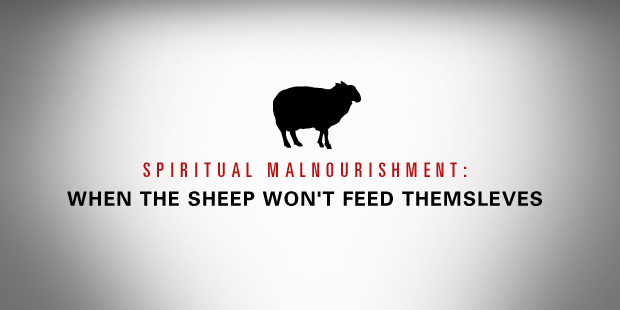
Spiritual Malnourishment: When the Sheep Won’t Feed Themselves
One of the greatest critiques of the American Church today is that it’s malnourished. Some would even say it’s our most pressing problem.
When most people voice this complaint, the focus is on the worship experience. From people who leave these churches, you hear, “I wasn’t getting fed.” Or, “I just want some deeper teaching.” From people outside these churches you hear, “too much milk, not enough meat.”
In some cases, I’m sure this is true. But I really don’t think that’s the real problem. Yes, American Christians are malnourished. But I don’t believe it has anything to do with milk or meat.
Most American Christians aren’t malnourished because of what they’re getting fed on Sunday. They’re malnourished because they don’t feed themselves Monday through Saturday.
So you had filet mignon on Sunday and learned about the mystical union of Christ and the church as it relates to the rapture and the design of the tabernacle in relation to Levitical dietary laws as understood by the Council of Trent. Good for you. Have fun starving yourself the rest of the week and letting your pastor read the Bible so you don’t have to.
So you had some milk on Sunday and learned 37 ways to ________. Have fun having 37 new ways to not obey God during the coming week.
The crisis facing the church today isn’t what people are getting fed on Sundays. It’s what they’re not feeding themselves the rest of the days. Who really cares whether you consume meat or milk on Sunday if it’s the only meal you have all week?
I’m not saying this to get pastors and churches off the hook. It is the shepherd’s job to feed the sheep (John 21). And feed them well based on their needs and faith development. But it’s also the sheep’s job to eat:
13Anyone who lives on milk, being still an infant, is not acquainted with the teaching about righteousness. 14But solid food is for the mature, who by constant use have trained themselves to distinguish good from evil.
Hebrews 5:13-14
Here’s the point. Churches: we have a responsibility. We should serve up the Word, hot and fresh every single Sunday. As church leaders, it is our job to create and sustain processes and systems that responsibly enable people to grow in their faith after receiving Christ.
People in our churches: you also have a responsibility. If you refuse to study the Word, apply it, pray some during the week, join a small group and dig deeper with others, there’s not much we can do to help you. Your malnourishment won’t be cured by anything we give you on Sunday.
So are you an infant and need milk? Drink it for now, but the only way you’re getting more mature and will be ready for meat is by training yourself. Constantly. Do you want meat? From these verses, it seems like meat is doing the milk. On your own. Constantly.
Not getting it served to you once a week.

Tags: Discipleship, Scripture, Steven Furtick, Worship












